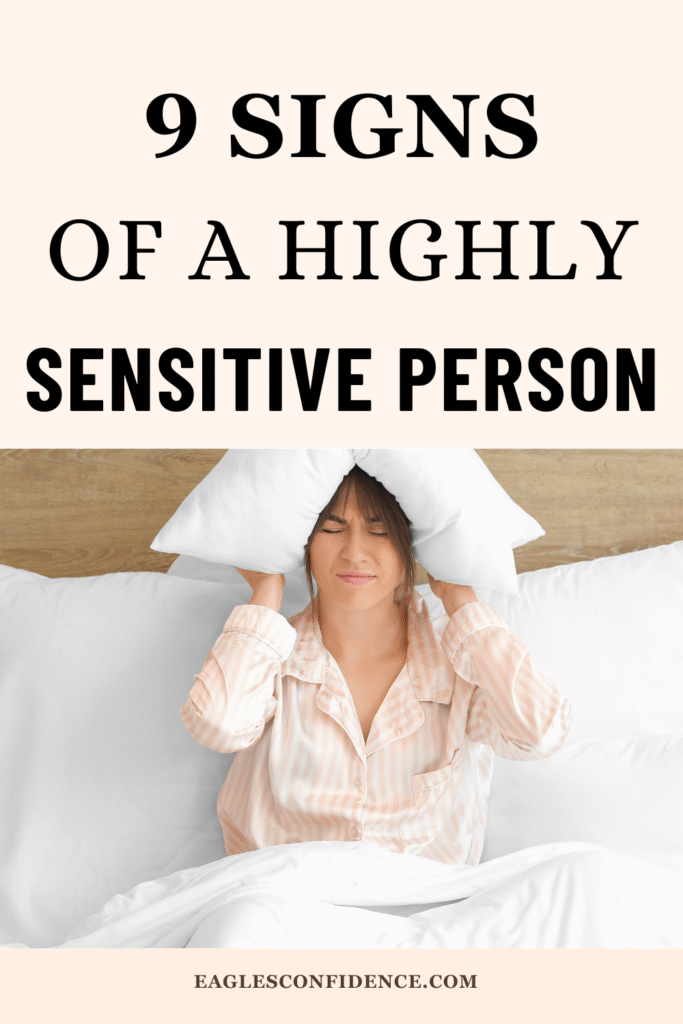Being a highly sensitive person reflects a temperament trait where individuals show heightened awareness of both external and internal stimuli together with feelings and sensations. This term refers to a particular set of characteristics, which is extremely common.
Highly sensitivity is not a weakness or an illness. In contrast, it’s a personality trait with its own potential, challenges, and benefits. Highly sensitive people have several advantages, such as empathy, creativity, or intuition. They tend to be very perceptive of emotions, both their own and other people’s, and can often understand others and their problems with ease. Highly sensitive people are also more likely to notice subtle changes in their environment, such as the feeling of wind or small details in a conversation. However, there are some downsides as well. For example, they may be more prone to stress or overstimulation, and they can find it difficult to cope with large crowds or loud noises. They may also experience emotional exhaustion after spending time with other people.
Signs of a Highly Sensitive Person
1. Deep Emotional Responses
One of the most prominent signs of highly sensitive person is a powerful emotional response, which usually distinguishes highly sensitive people from those who have an average level of sensitivity. This quality means that they can experience a whole range of deep and powerful feelings. On the one hand, this is a wide spectrum of positive emotions, such as joy, exhilaration, inspiration, and love. On the other hand, it is a variety of negative emotions like grief, sorrow, frustration, or even rage.
As a result, these people are considered highly sensitive, as they can feel much more and more deeply in comparison with those with low sensitivity levels. In addition, highly sensitive people are known to experience emotions that they do not express. This is why many people with an HSPs are often very emotional about art: music, books, or films. It may be like their soul is resonating with art, and they experience a whole ocean of feelings every time they read or listen to something they like.
For example, imagine a highly sensitive person watching a sad or sentimental scene in a movie that makes many people cry. This person is likely to start crying quickly, if at all, while some may even feel indifferent. As a result, being a highly sensitive person is a continuous emotional ride, which has its ups and downs. This may be a reason for great happiness, but there is an opposite side to the coin as well. This is a severe feeling, for example, in crowded places full of noise, where Highly sensitive person can experience emotions not only from their sensitivity but also from the sensitivity of other people around them. This is why these people are likely to experience a range of negative emotions and look for an opportunity to move away to a calmer place.
2. Sensitivity to External Stimuli
Highly sensitive people are typically much more sensitive to outside stimuli than people who are less sensitive. This means that these people may experience things around them more intensely and vividly than other people do. This quality of a highly sensitive person may often lead to overstimulation by strong light, noise, or smell.
For example, if there is a highly sensitive person in a café, where many different coffees with a strong aroma are cooked at the same time, and there are loud conversations and music all around, they will not be able to focus on a simple task or have a normal conversation with their friends. As a result, they will be completely worn out and mentally exhausted. There is another typical example of highly sensitive persons who cannot work under fluorescent lights in the office. This may be so because of the bright light that enters their eyes and causes irritation.
In such a situation, such a person will most likely move to a place with less light, or even go outside to get some sun and relief. This type of reaction to the outside world is known as gentle or gentle awareness. This is a gift for artists and writers in many ways, but in other situations, it can be extremely annoying and exhausting for these people, who, as a rule, may be considered highly sensitive persons.
For this reason, it is crucial to surround themselves with everything that will calm down and soothe. This could be, for example, their own room with a specific color palette or specific aromas that highly sensitive people are not allergic to. Acknowledging the limits of a highly sensitive person can help them live a happy and full life.

3. A Strong Empathetic Nature
The first of the most significant signs of highly sensitive person is a deep, strong, and powerful sense of empathy. This ability helps people easily feel, perceive, and understand the mood and feelings of those around them. Being empathetic, a highly sensitive person is a quality that helps them to feel what others feel. For these people, empathy is a completely natural, primary, and genuine ability.
As a result, Highly sensitive persons often tend to feel the emotions of others as their own. However, an HSP’s strong empathy can also be the source of a great deal of negative emotions. In other words, this is because they are often in a position where they have to feel the pain and suffering of others. In such situations, they will often become even more affected than those who are in a difficult or even tragic situation. This may lead to a range of symptoms in these people, which can range from depression to headaches or other types of physical and mental discomfort.
A good way to help these people to cope with this situation is to talk with them about what they are experiencing. By sharing their feelings, both people will be able to feel relief and try to support each other in this situation.
Related: 8 Signs You Are a Highly Emotional Person
4. Reflective Thinking
Highly sensitive people often tend to think about everything deeply and comprehensively, which is another of the major signs of highly sensitive person. This trait helps them to better understand and perceive all the different aspects of a situation. For HSPs, the ability to think deeply and understand the subtle nuances of each situation and each problem is a common feature that helps them be much more effective than other people. As a result of this, these people often look at different situations and problems from various points of view.
However, this ability can also lead to excessive and too much “overthinking” of almost any situation, and also be the cause of many problems. On the one hand, these people can think about things for a very long time and never reach the final conclusion or decision that would be appropriate for them. On the other hand, many highly sensitive people often overthink. This is why many people with an HSPs are always in a state of “rumination,” which can lead to overthinking of many different things. This feature may be both good and bad at the same time. While it may lead to being more successful in life, there are also some major downsides.
5. Need for Solitude
Highly sensitive people often demonstrate a strong need for solitude, which is the common and obvious need to be alone, without being disturbed. This feature helps these people to return to their own inner world after spending a long time among a lot of people or in highly stressful situations. The world of highly sensitive people is often a world of too many different impressions, which can be quite strong, for example, in the form of loud noise, strong lights, and other people’s feelings.
All this can quickly lead to the fact that highly sensitive people will no longer be able to concentrate on something, as they will have too much noise in their head. For this reason, solitude is the only thing that can help these people, as it can let them restore their emotional balance. During this time, they will have the time to think and reflect on what is happening to them. In such a way, these people can return to their normal state, which is what they need. In their solitude, they can also do other things that they like, such as creative activities, meditation, or just walk in the park.
However, there are also some major downsides for highly sensitive persons as well. For example, sometimes these people may be surrounded by many other people, which can be very uncomfortable for them. This can be very hard for HSPs to cope with, and they will probably experience significant anxiety, stress, or other negative emotions. For this reason, it is often difficult for people to tell their friends or family that they need some alone time.
6. Strong Reactions to Injustice
Highly sensitive people often tend to be highly emotionally responsive in different situations of injustice, which is another major sign. These people often may experience a higher degree of empathy, which helps them be highly sensitive. In other words, this feature can be described as an unusual emotional response to different situations, during which these people may feel high empathy for other people. In such situations, these people are often highly likely to feel like they themselves are experiencing some sort of damage, in addition to the pain of other people.
For instance, in the situations of injustice, Highly sensitive persons often tend to feel like they are the ones who are experiencing great suffering and misfortune. This can include, for example, seeing such problems as poverty, discrimination, war, and other similar issues. In addition to this, these people are also likely to feel physical pain when they are in such situations, which can cause even more negative emotions. The ability of highly sensitive people to react so strongly to such situations is the key reason why these people are so much more likely to help and support other people.

7. Difficulty with Change
Highly sensitive people often may demonstrate difficulty with change, which may be tightly connected with their emotional state. For example, due to their emotional sensitivity and the ability to deeply experience all the different aspects of life, these people may often experience greater anxiety and stress during a time of change. This is because they are much more likely to experience some sort of changes in their lives, which is highly likely to lead to some negative consequences. For example, this may be a move to a new place, a new work, or some other minor or major changes. In such situations, these people will often experience various feelings, such as fear, panic, insecurity, and even more powerful feelings, which can be very difficult for these people.
Change and different types of adjustments are some of the hardest things for these people, as they are highly likely to lead to serious anxiety and even stress for them. For this reason, these people need to learn how to deal with all these different types of emotions, as well as their anxiety. The first thing that should be understood in order to deal with all of these emotions is the fact that highly sensitive persons often experience powerful and significant anxiety, stress, and other negative emotions during the time of change. The next thing to understand is that all these different feelings are highly likely to be greatly reduced if highly sensitive people learn to better cope with these situations.
8. Fear of Conflict
Highly Sensitive Persons tend to have a genuine aversion to conflict and all types of arguments. This is the common feature that helps these people to avoid every situation that may lead to a conflict. In such situations, these people tend to highly likely stay away from any conflicts, as they are often highly likely to feel very bad and experience severe anxiety and stress. This may also lead to different types of negative emotions, which can make the life of these people much harder and more challenging. For example, many people with highly sensitive persons may find it very hard to be involved in any arguments, which can be highly likely to lead to greater anxiety and even stress.
The main reason for this is the fact that many people with HSPs are highly likely to experience very powerful negative emotions during such situations. This is why it is highly likely for these people to find it very hard to be in any conflicts. There are some major downsides for highly sensitive persons as well, as these people will often have to avoid any arguments, which can make their lives much harder and more challenging. However, at the same time, this is also the key reason why these people need to understand the situation that they are in. This is why it is important to learn how to better deal with these situations, as well as how to learn how to avoid them.
Related: How To Know When You Are Experiencing Burnout
9. Intuition and Gut Feelings
A highly sensitive person often tend to have great intuition. This quality is highly likely to be the direct consequence of the fact that these people may highly likely experience powerful and meaningful emotional sensitivity. For example, this quality is highly likely to help these people to be able to feel and sense almost everything, including the underlying emotions of other people. For example, there is a situation where these people may be highly likely to experience some type of strong emotions in one form or another.
In such a situation, these people will often feel like they are being overpowered by their emotions. This can highly likely lead to a state of confusion, which is highly likely to make their life much more difficult and challenging. The key reason for this is the fact that there is a high likelihood for these people to highly likely experience some type of confusion, which is highly likely to lead to greater anxiety, stress, and even more powerful negative emotions. However, at the same time, there is a high likelihood for these people to better deal with these situations, as well as to be able to use them to their advantage.
Save the pin for later

- 10 Signs of a Cheating Partner You Should Never Ignore - January 11, 2026
- 10 Effective Ways to Practice Gratitude - November 20, 2025
- 12 Everyday Habits That Can Diminish Your Memory Power - November 15, 2025




